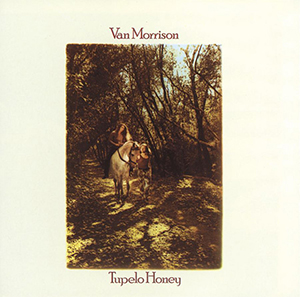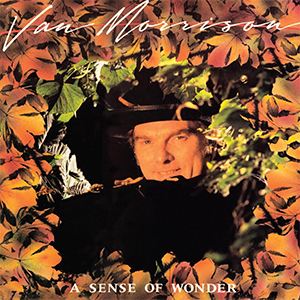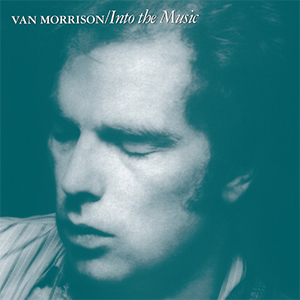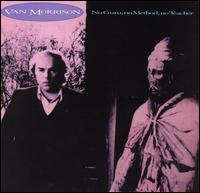
Moondance is the third studio album by Northern Irish singer-songwriter Van Morrison. It was released on 27 January 1970 by Warner Bros. Records. After the commercial failure of his first Warner Bros. album Astral Weeks (1968), Morrison moved to upstate New York with his wife and began writing songs for Moondance. There, he met the musicians that would record the album with him at New York City's A & R Studios in August and September 1969.

Astral Weeks is the second studio album by Northern Irish singer-songwriter Van Morrison. It was recorded at Century Sound Studios in New York during September and October 1968, and released in November of the same year by Warner Bros. Records.

Tupelo Honey is the fifth studio album by Northern Irish singer-songwriter Van Morrison. It was released in October 1971 by Warner Bros. Records. Morrison had written all of the songs in Woodstock, New York, before his move to Marin County, California, except for "You're My Woman", which he wrote during the recording sessions. Recording began at the beginning of the second quarter of 1971 at Wally Heider Studios in San Francisco. Morrison moved to the Columbia Studios in May 1971 to complete the album.

Veedon Fleece is the eighth studio album by Northern Irish singer-songwriter Van Morrison, released in October 1974. Morrison recorded the album shortly after his divorce from wife Janet (Planet) Rigsbee. With his broken marriage in the past, Morrison visited Ireland on holiday for new inspiration, arriving on 20 October 1973. While there he wrote, in less than three weeks, the songs included on the album.

Saint Dominic's Preview is the sixth studio album by Northern Irish singer-songwriter Van Morrison. It was released in July 1972 by Warner Bros. Records. Rolling Stone declared it "the best-produced, most ambitious Van Morrison record yet released."

Hard Nose the Highway is the seventh studio album by Northern Irish singer-songwriter Van Morrison, released in 1973. It is his first solo album since his 1967 debut Blowin' Your Mind! to contain songs not written by Morrison. A cover version of the song "Bein' Green", usually associated with Kermit the Frog, is included, as is a take of the traditional song "Purple Heather". The album also contains the single "Warm Love," a fan favourite.

A Sense of Wonder is the fifteenth studio album by Northern Irish singer-songwriter Van Morrison released in 1985. On first release, original pressings had to be recalled when the W. B. Yeats estate refused to allow Morrison's musical version of the poem "Crazy Jane on God" to be included, as they believed his poems should only be set to classical music. Morrison substituted "If You Only Knew" for the Yeats' recording..

Into the Music is the 11th studio album by Northern Irish singer-songwriter Van Morrison, and was released in August 1979. It includes "Bright Side of the Road", which peaked at number 63 on the UK Singles Chart, and other songs in which Morrison sought to return to his more profound and transcendent style after the pop-oriented Wavelength. The record received favourable reviews from several music critics and was named as one of the year's best albums in the Pazz & Jop critics' poll.

Inarticulate Speech of the Heart is the fourteenth studio album by Northern Irish singer-songwriter Van Morrison, released in 1983. Morrison said he arrived at the title from a Shavian saying: "that idea of communicating with as little articulation as possible, at the same time being emotionally articulate". As his last album for Warner Bros. Records, he decided to do an album which had more than the usual complement of instrumental tracks. As he explained in 1984, "Sometimes when I'm playing something, I'm just sort of humming along with it, and that's got a different vibration than an actual song. So the instrumentals just come from trying to get that form of expression, which is not the same as writing a song." Although not expanded upon, of note is that a special thanks is given to L. Ron Hubbard in the liner notes. The reissued and remastered version of the album contains alternative takes of "Cry for Home" and "Inarticulate Speech of the Heart No. 2".

No Guru, No Method, No Teacher is the sixteenth studio album by Northern Irish singer-songwriter Van Morrison, released in 1986 on Mercury.

Avalon Sunset is the nineteenth studio album by Northern Irish singer-songwriter Van Morrison. It was released in 1989 by Mercury Records to both commercial and critical success. In 2008, Avalon Sunset was reissued and remastered, featuring an alternate take of "Whenever God Shines His Light", and a version of "When the Saints Go Marching In" with additional lyrics by Morrison.

Back on Top is the twenty-seventh studio album by Northern Irish singer/songwriter Van Morrison, released in 1999 by Point Blank. It reached the Top Twenty in seven countries, building on the success of 1997's The Healing Game.

"Summertime in England" is the longest song on Northern Irish singer-songwriter Van Morrison's 1980 album, Common One, and is approximately fifteen minutes long. Although the album on which the song appeared was not critically or commercially successful, the song would be performed by Morrison in concert for almost two and one-half decades, taking on new meaning when performed live. A truncated version of the song with an early fade-out was also released as the B-side of the 1983 single "Cry for Home".

"Domino" is a hit song written by Northern Irish singer-songwriter Van Morrison. It is the opening track of his fourth studio album, His Band and the Street Choir. This song is Morrison's personal musical tribute to New Orleans R&B singer and pianist Fats Domino.

"Cleaning Windows" is a song written by the Northern Irish singer-songwriter Van Morrison, recorded on his 1982 album Beautiful Vision.

"Days Like This" is a song written by Northern Irish singer-songwriter Van Morrison and the title song of his 1995 album of the same name. Morrison has often performed this song in concert appearances,and it has become one of his most popular songs from his later years. It peaked at number 65 in the UK upon release, and later reached number 12 on the US Billboard US Rock Digital Song Sales chart.

Live at Montreux 1980/1974 is the first official DVD by Northern Irish singer-songwriter Van Morrison. It was released on 16 October 2006. The films consist of two separate performances by Van Morrison at the Montreux Jazz Festival in Switzerland. It was certified gold in May 2007 and platinum in June 2009.

Live at the Grand Opera House Belfast is a live album by Northern Irish singer-songwriter Van Morrison, released in 1984. It was recorded from four live shows in March 1983 at the Grand Opera House, Belfast, Northern Ireland. The album was composed of songs from Morrison's last four recordings. It is the second live album Morrison released, following 10 years after It's Too Late to Stop Now.

"The Healing Game" is the title song on Northern Irish singer-songwriter Van Morrison's 1997 album. It was released twice as a single in 1997 as an A-side with different B-sides – including "Have I Told You Lately" and "Gloria". The single reached number 46 in the UK.
"Burning Ground" is a song written by Northern Irish singer-songwriter Van Morrison and included on his 1997 album, The Healing Game. For this song, Morrison got his inspiration from a common scene from his childhood when jute was shipped to Belfast from India in the 1950s.



















